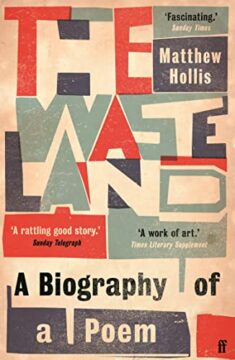Nathaniel Rosenthalis in The Common Reader:
 My first impression, upon opening Hollis’s The Waste Land: A Biography of a Poem was admittedly delicious. A usual kind of epigraph greets us: “There is always another one walking beside you,” from Eliot’s poem, but then we turn the page, and on the back of the epigraph page is a quotation from Eliot, a meaty paragraph, and facing it, on the right-hand side, is a shorter passage from Pound. Right away, then, the two men are side by side, in the opening pages in a way that disrupts the usual front page material of a tome. It is a nice touch that not only forecasts the book’s focus on the relationship between the two men in the crafting of one of the inarguably influential English language poems of the twentieth century but also indicates the attention to detail and summoning of atmosphere that characterize the bulk of Hollis’s project, if not its achievement. Which is this: to demythologize, and at times painfully, re-animate the gross disturbances in Eliot’s life and character that, for better or worse, have bequeathed us the still-jarring title poem.
My first impression, upon opening Hollis’s The Waste Land: A Biography of a Poem was admittedly delicious. A usual kind of epigraph greets us: “There is always another one walking beside you,” from Eliot’s poem, but then we turn the page, and on the back of the epigraph page is a quotation from Eliot, a meaty paragraph, and facing it, on the right-hand side, is a shorter passage from Pound. Right away, then, the two men are side by side, in the opening pages in a way that disrupts the usual front page material of a tome. It is a nice touch that not only forecasts the book’s focus on the relationship between the two men in the crafting of one of the inarguably influential English language poems of the twentieth century but also indicates the attention to detail and summoning of atmosphere that characterize the bulk of Hollis’s project, if not its achievement. Which is this: to demythologize, and at times painfully, re-animate the gross disturbances in Eliot’s life and character that, for better or worse, have bequeathed us the still-jarring title poem.
More here.
